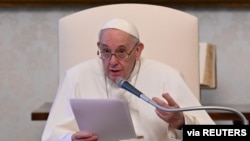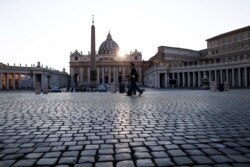Pope Francis has issued an anti-corruption decree requiring Vatican managers, including cardinals, to sign a declaration attesting they are not being investigated or have not been found guilty of terrorism, money-laundering or tax evasion. The new regulations are part of the pope's long battle against corruption inside Vatican's walls.
Since his election in 2013, Pope Francis has been battling corruption inside the Vatican and his decree issued Thursday mandates full economic disclosure and controls for all managers working for the city state, including cardinals.
They will be required to sign a declaration when they are appointed attesting that they have never been convicted of a crime. They will also be required to declare that they are not under investigation for offenses including money laundering, corruption, fraud, exploitation of minors or tax evasion.
Vatican managers will also have to declare they are investing funds that are consistent with the Catholic Church's social doctrine. In addition, the decree states that they will not be allowed to use tax havens or accept any work-related gifts that are worth more than $48. They also cannot hold real estate obtained with illegal funds.
Last May, Pope Francis issued another decree tightening the rules on Vatican departments to secure contracts. But the pope's latest anti-corruption crackdown is the toughest since he took office eight years ago to ensure Vatican City employees are not involved in illegal financial activity.
For the past two years, prosecutors have been investigating allegations of corruption in a Vatican investment into a London property deal. The Vatican has been involved in numerous financial scandals and the pope has made clear he would battle corruption from the outset of his pontificate.
Pope Francis has spoken out about the issue of corruption on many occasions. One of those times was during a trip to Kenya, two years after being elected.
Cases of corruption, he said, are found not only in politics, but in all institutions and inside the Vatican as well. Corruption, he added, is something that hits us inside. It's like sugar, it's sweet, we like it. It's easy. But then, the pope concluded, it ends badly.
The pope's new decree made clear that Vatican employees must adhere to "internationally accepted regulations and best practices" that require transparency to fight "conflicts of interest, patronage practices and corruption in general."
Moneyval, the Council of Europe's Committee that evaluates anti-money laundering measures and the financing of terrorism, is expected to publicly release its report soon, which also includes details on the Holy See's adherence to combat those practices.





